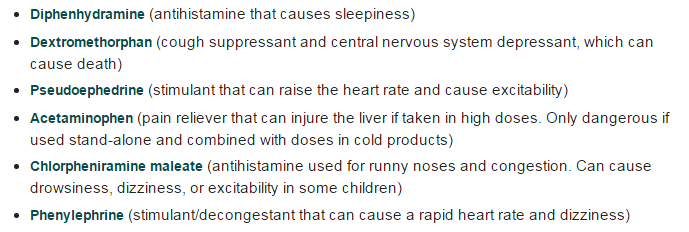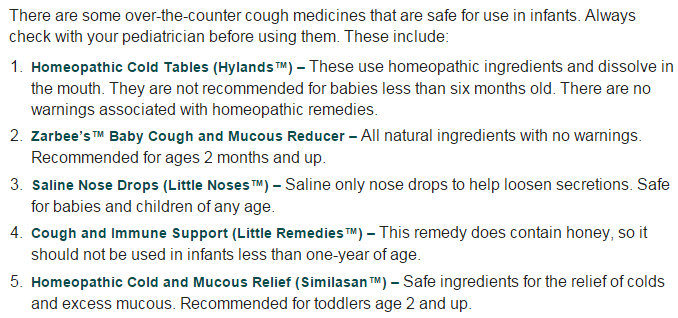Colds are never easy to deal with for anyone. When your child or children catch colds, they can be even more miserable than adults. The common question among parents is, is it safe to use decongestant medications. Decongestants need to be safe and only used if they are over 2 years old, some cannot be used for kids younger than 6.You will want to consult with your pediatrician about the safety. This article gives you some information to help you make a good and safe choice for your child.
The Safety of Decongestant for Kids
The Food and Drug Administration has stated that using OTC cold and cough medications containing antihistamines or decongestants for children under the age of 2 is not recommended. There have been serious injuries due to side-effects and even fatalities. Cough Syrup with Dextromethorphan should also be avoided. Examples of harmful ingredients to watch out for include:

The FDA also stated most of the adverse events with cold medications and decongestants are usually associated withoveruse, over dosage, or using “combination” cold products.
Included below are common types of decongestant for children. Always talk to your doctor about how much to use since dosages are based on your child’s weight and age.
Types of Medications for Kids
It is important to know what the ingredients in cold medicines do so you don’t overload your kids with medication they don’t really need. Some ingredients are more powerful when mixed with other things, which can be very harmful for kids. Some of the more common names of cold medications, including decongestant for kids are:
- Triaminic ™
- Robitussin ™
- Tylenol ™
- Vicks ™
- Pediacare ™
- Little Remedies ™
- Dimetapp ™
- Sudafed ™
Many drug stores have “knock-off” versions of name brand medications. If you choose to buy the cheaper store brand, just make sure you compare labels very carefully and always ask your pharmacist for assistance if needed.
Decongestant Medications
Decongestant medications can unblock a stuffy nose and dry up runny noses. This is because they contain stimulants includingpseudoephedrine and phenylephrine. These can increase hyperactivity in some children or even cause irritability. Examples of decongestants include:
- Children’s Sudafed Nasal Decongestant ™
- Triaminic Chest formula ™
- Mucinex Children’s Chest Congestion ™
- Children’s Dimetapp ™
- Pediacare Children’s Decongestant ™
- Robitussin Cough and Cold ™
Keep in mind that some of these “cough and cold” formulas also contain dextromethorphan, so they should not be used separately from cough suppressant medications. This would double the dose of dextromethorphan and have very dangerous side-effects.
Tylenol ™ (Acetaminophen)
Tylenol when used alone is safe when used in proper dosages. This medication helps relieve pain and fever. It is very easy to give your child a dose of acetaminophen by itself and then accidentally overdose by giving a cold medicine combination that contains Acetaminophen. For this reason, it is best to use a cold medicine without acetaminophen.
Antihistamine Medications
These tend to work best for congestion that is related to allergies. The side effects include drowsiness and possible hyperactivity. The main ingredients that are antihistamines arediphenhydramine, chlorpheniramine, brompheniramine, and carbinoxaimine. These are often used in “cough and cold” combination medications and “nighttime formula” types. Some of the decongestant medications that contain antihistamines are:
- Benadryl ™
- Triaminic Night Time Cold and Cough ™
- Dimetapp Children’s Cold and Allergy ™
- Pediacare Night Rest cough and Cold for Children ™
- Night Time Triaminic Thin Strips Cold and Cough™
These should not be used during the day as they can make your child sleepy. If you find the opposite happens, talk to your doctor as hyperactivity can be an adverse reaction.
Cough and Cold Formula Medications
These are combination formulas that contain both a decongestant for kids and a cough suppressant. When you choose these you will not need separate medications and use caution not to mix them. Watch if you are using an antihistamine on the side because unless the medication says “non-drowsy” it may contain an antihistamine ingredient and could cause side-effects of excessive sleepiness in your child. Some types are:
- Dimetapp Children’s Cough and Cold ™
- Dimetapp Children’s Decongestant Plus Cough Non-Drowsy ™
- Little Colds Decongestant Plus Cough Non-Drowsy ™
- Pediacare Decongestant and Cough Non-Drowsy ™
- Robitussin CF Cough Syrup Non-Drowsy ™
- Triaminic Daytime Cold and Cough Non-Drowsy
- Vicks Nyquil Children’s Cold and Cough ™
- Vicks Pediatric 44M Cough and Cold Relief ™
Use caution with Nyquil ™ as some of the formulas contain alcohol. Never give a child adult formula Nyquil as these are very potent.
Cough Suppressant Medications
Cough suppressant medications can help quiet coughing and help your child get some rest. These are okay as long as your child is breathing okay and doesn’t have excess mucous. Using a cough suppressant with excess mucous can lead to pneumonia since the body needs to cough up the mucous. They contain dextromethorphan, which can make your child sleepy and depress breathing. A few cough suppressants for kids are:
- Robitussin Children’s Cough-Long acting ™
- Delsym Children’s
- Triaminic Cough
Keep in mind that some cough suppressant medications also contain decongestant and you want to check labels if you are using multiple products.

Home Tips to Ease Kids’ Congestion
It is possible with a little effort to make your child comfortable without the use of medications. They should only be used as a long resort and under the supervision of your pediatrician. Here are some home tips before trying a decongestant for kids:
- Moisten the air. Use a humidifier to moisten the air in your home and your child’s room. You can also create steam in the bathroom by turning on the hot shower and sitting with your child on the toilet seat for 10 to 15 minutes.
- Increase fluids and use saline drops. Give your child plenty to drink. Enough is when they are peeing almost clear with little yellow tint. You can also use saline nasal drops to loosen mucous in the nose.
- For more practical tips like changing sleep positions, you can click HERE.
Here are more tips for you to help your congested child with remedies like vapor rub and saline solution:






